March 2025
Clinical Data Analytics Solutions Market (By Deployment: On-premise, Cloud-based; By Application: Clinical Decision Support, Clinical Trials, Regulatory Compliance, Others) - Global Industry Analysis, Size, Share, Growth, Trends, Regional Outlook, and Forecast 2024-2034
The global clinical data analytics solutions market size was USD 4.75 billion in 2023, calculated at USD 5.07 billion in 2024 and is expected to reach around USD 9.82 billion by 2034, expanding at a CAGR of 6.83% from 2024 to 2034. The rising emphasis on drug development is driving the growth of the market.
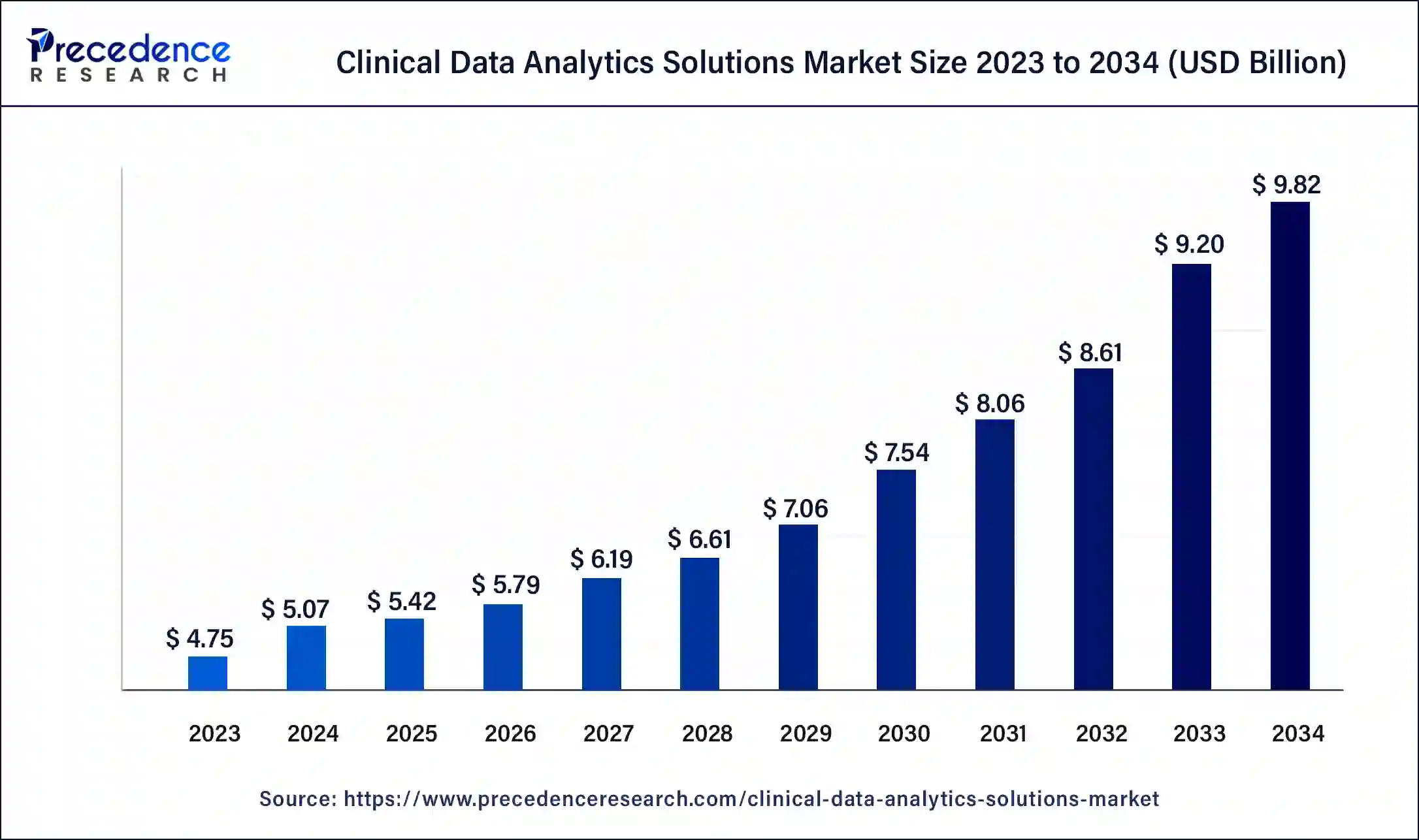
The U.S. clinical data analytics solutions market size was exhibited at USD 1.57 billion in 2023 and is projected to be worth around USD 3.30 billion by 2034, poised to grow at a CAGR of 6.98% from 2024 to 2034.
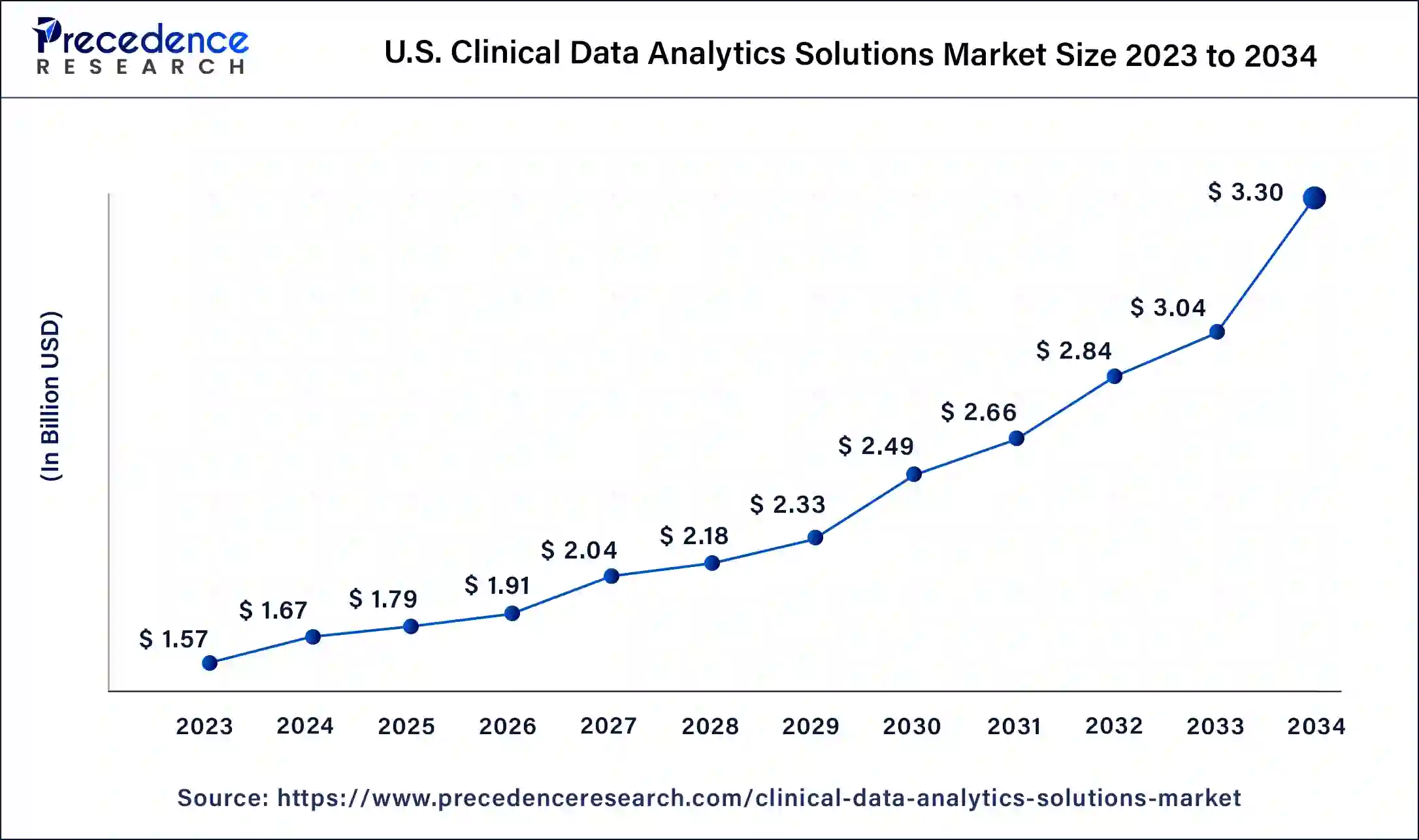
North America dominated the clinical data analytics solutions market with the largest market share in 2023. The growth of the market is attributed to the rising technological advancements in the healthcare infrastructure and the early adoption of technologies in several healthcare operational workflows that boost the growth of the market. The rising implementation of clinical data analytics solutions in pharmaceuticals for drug development is contributing to the growth of the market. The rising geriatric population and the increasing prevalence of chronic diseases in the population drive the demand for clinical data analytics solutions for better patient outcomes and personalized treatment by analyzing patient medical history, which fuels the expansion of the clinical data analytics solutions market in the region.
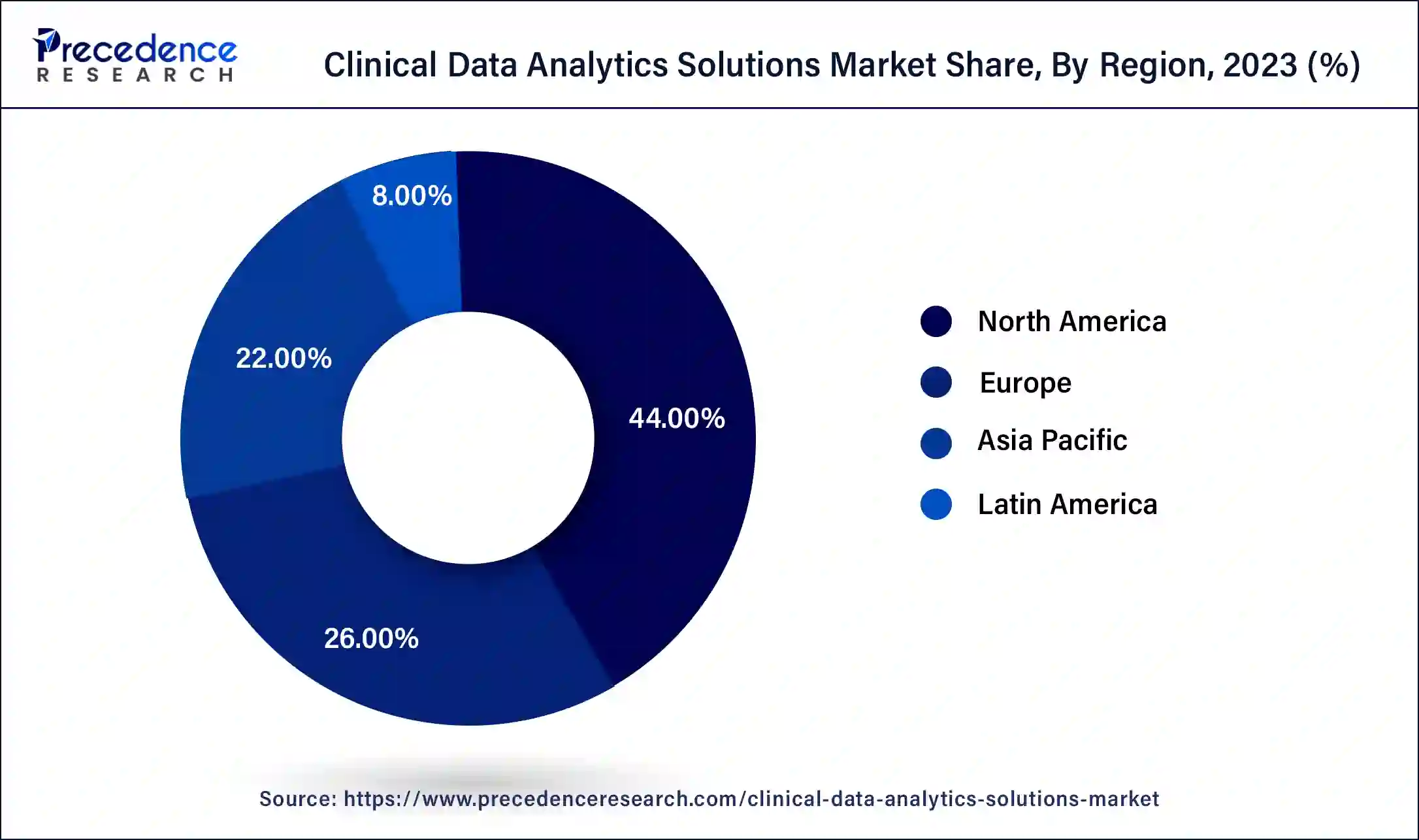
Europe is expected to have the fastest growth during the forecast period. The growth of the European market is due to the higher adoption of artificial intelligence and machine learning technologies in the healthcare sector for the enhancement of services and in several diagnosis procedures, such as radiology and pathology. The government's rising intervention with investments in digital health infrastructure, such as telehealth, has contributed to the growth of the clinical data analytics solutions market across the region.
The clinical data analytics solutions market is playing a significant role in the healthcare industry. Clinical data analytics helps the healthcare organization to transfer or convert the raw healthcare data into actionable insights. The data can generally come from the HIMS system, electronic medical records (EMRs), and others. There are four major types of clinical data analytics that are adapted by a number of healthcare settings, including descriptive analytics, diagnostic analytics, predictive analytics, and prescriptive analytics. There are several benefits associated with clinical data analytics in healthcare organizations. It helps in making better and informed decision-making processes, rapid diagnosis of diseases, patient care, enhanced operational efficiency, cost control, and research and development. Thus, all these factors are contributing to the growth of the clinical data analytics solutions market.
| Report Coverage | Details |
| Market Size by 2034 | USD 9.82 Billion |
| Market Size in 2023 | USD 4.75 Billion |
| Market Size in 2024 | USD 5.07 Billion |
| Market Growth Rate from 2024 to 2034 | CAGR of 6.83% |
| Largest Market | North America |
| Base Year | 2023 |
| Forecast Period | 2024 to 2034 |
| Segments Covered | Deployment, Application, and Regions |
| Regions Covered | North America, Europe, Asia-Pacific, Latin America, and Middle East & Africa |
Rising adoption of data analytics in healthcare
Data analytics in healthcare is enhancing several healthcare services like patient care, telemedicine, diagnostics, patient treatment, health population management, medical research, precision medicine, preventive medicine, and cost reduction. Data analytics helps improve the quality of patient care by adapting various measures such as decision support on a large database for medical treatment and diagnosis. Data analytics helps in several clinical practices that help in the early detection of disease and epidemiological risk and enhance the control of pathogenic spots and reaction rates.
It helps in analyzing the condition or stage of the disease, predicting progression, and the risk of complications. Additionally, clinical data analytics helps scientific and research activities and allows researchers to work effectively and efficiently. It is used in the development of new drugs, treatment procedures, and clinical trials by analyzing available data. Thus, all these factors are driving the growth of the clinical data analytics solutions market.
Data security issues
Data security issues are one of the major factors impacting the expansion of clinical data analytics solutions in the healthcare industry. Data analytics in healthcare are concerned with several privacy concerns, such as the enactment of regulations like the Health Insurance Portability and Accountability Act (HIPAA). The sensitive nature of the healthcare data of the patient and making them available in the open source is vulnerable to potential data breaches. Centralized healthcare data is also more vulnerable to cyber-attacks. Thus, the rising cyber-attacks and the risk of data breaches are restraining the growth of the clinical data analytics solutions market.
AI in data analytics
The integration of artificial intelligence in healthcare is improving the number of services in the industry. Technologies like artificial intelligence and machine learning help in the early diagnosis of diseases by analyzing available clinical data, predicting patient outcomes, and recommending treatment as per the disease condition of the patients. AI algorithms are used in analyzing medical images like MRIs and X-rays with improved accuracy and speed as compared to humans. It helps in the early detection of chronic diseases like cancer and other genetic disorders. The rising adaptation of AI in clinical data analytics is developed to support automation and simplify the data analyzing stages. AI also supports clinical data management.
AL leverages several clinical data management applications, such as clinical trial optimization, predictive risk modeling, and electronic health record (EHR) replacements. AI and ML analyze the patient history and recommend a personalized treatment plan for the patients that helps in improving patient outcomes. It reduces the overall healthcare cost and patient’s risk. Thus, the adoption of AI and ML in clinical data analytics enhances the overall process, decision-making, and patient outcomes. Thus, the integration of AI in healthcare and clinical data management is driving the opportunity in the growth of the clinical data analytics solutions market.
The cloud-based segment held the largest clinical data analytics solutions market share in 2023 and is expected to grow at the fastest rate during the forecast period. The growth of the segment is attributed to the rising adoption of cloud-based clinical data analytics in the healthcare sector due to its offerings that allow infrastructural development as per the data demand. Cloud-based platforms minimize the organization's overall expenses, such as on-premise infrastructure and maintenance costs. It can be customized according to the evolution or fluctuation of the quantity of data. Cloud-based data analytics helps the organization minimize the initial capital investment.
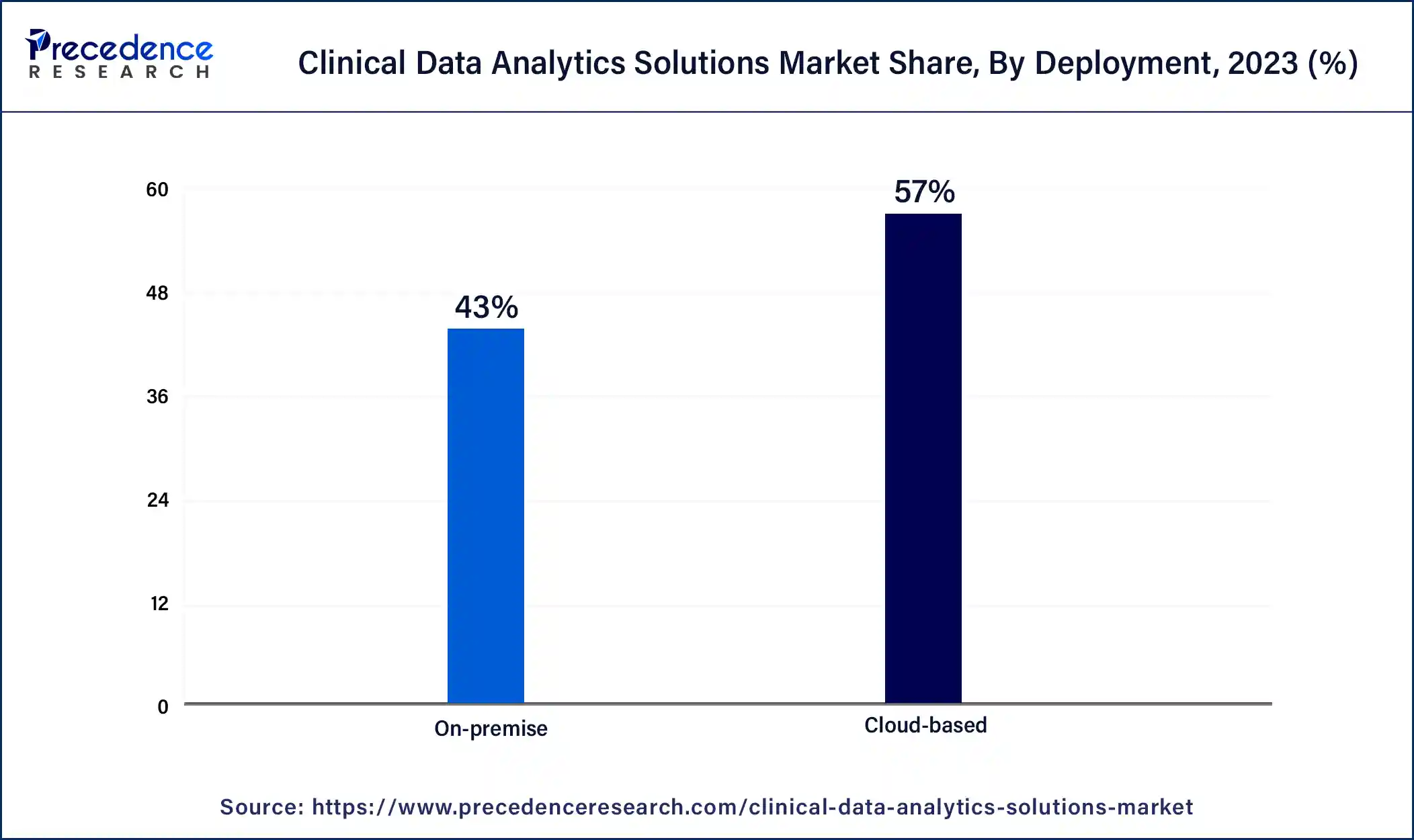
It is a pay-as-you-go model, and it enables remote accessibility, driving the partnership with healthcare investors, healthcare professionals, and researchers. Cloud-based data analytics is comparatively enhanced in features with the integration of artificial intelligence and machine learning technologies that help improve accuracy in clinical data insights. Thus, all these advancements are driving the growth of the cloud-based segment in the clinical data analytics solutions market.
The clinical trial segment accounted for the largest clinical data analytics solutions market share in 2023. The extensive investment in clinical trials in the healthcare and pharmaceutical industry is driving the demand for the segment. The clinical trial is the research on the behavioral, medical, and surgical interventions in people. Clinical trials mainly focus on the research in the development of new drugs, treatment procedures, surgical instruments, or devices that are safe and effective for people. Clinical trials are continuously evolving procedures in the healthcare and pharmaceutical industry; there are several new advancements, such as stem cell research, immunotherapy, cancer therapy, and genomics, which are included in the clinical trials.
Clinical trial data analytics is used in several clinical procedures to help gain quicker insights into the evolution of the database of patients. Clinical trial data analytics is driven by artificial intelligence and machine learning technologies that help leverage the analysis, capabilities collection, and insights from real-time data. The adaptation of AI and ML in clinical trials helps in efficient drug discovery, reduces human working hours and the cost of drug development, and reduces the errors in drug development.
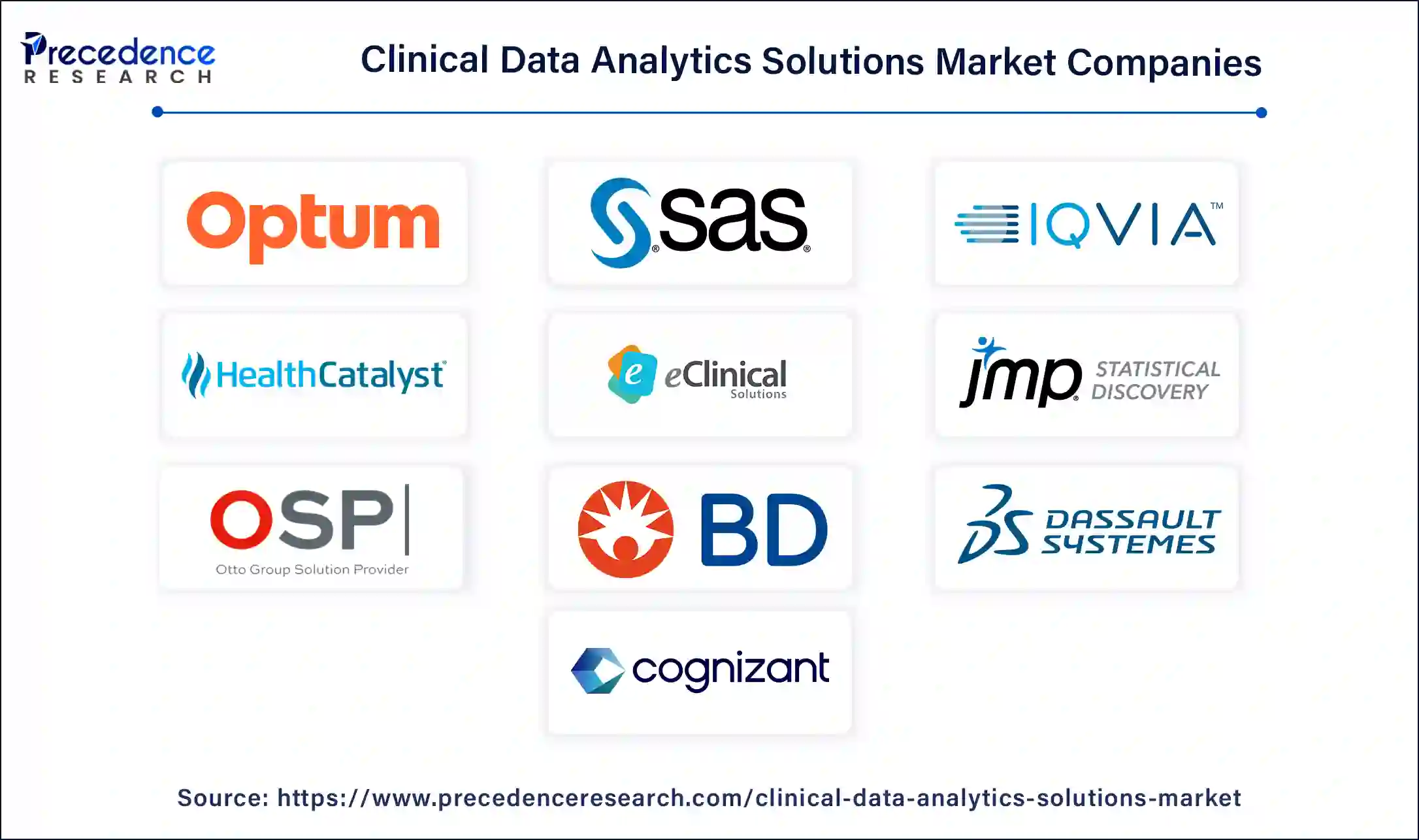
Segments Covered in the Report
By Deployment
By Application
By Geography
For inquiries regarding discounts, bulk purchases, or customization requests, please contact us at sales@precedenceresearch.com
No cookie-cutter, only authentic analysis – take the 1st step to become a Precedence Research client
March 2025
January 2025
February 2025
February 2025